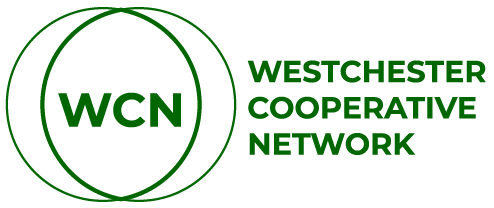The worker-owned, Black-led food cooperative quickly shifted their operation to provide emergency food during the height of the pandemic. Now, they are looking to transition to a longer-term vision of a community-based food hub.
CIVIL EATS – JULY 11, 2022
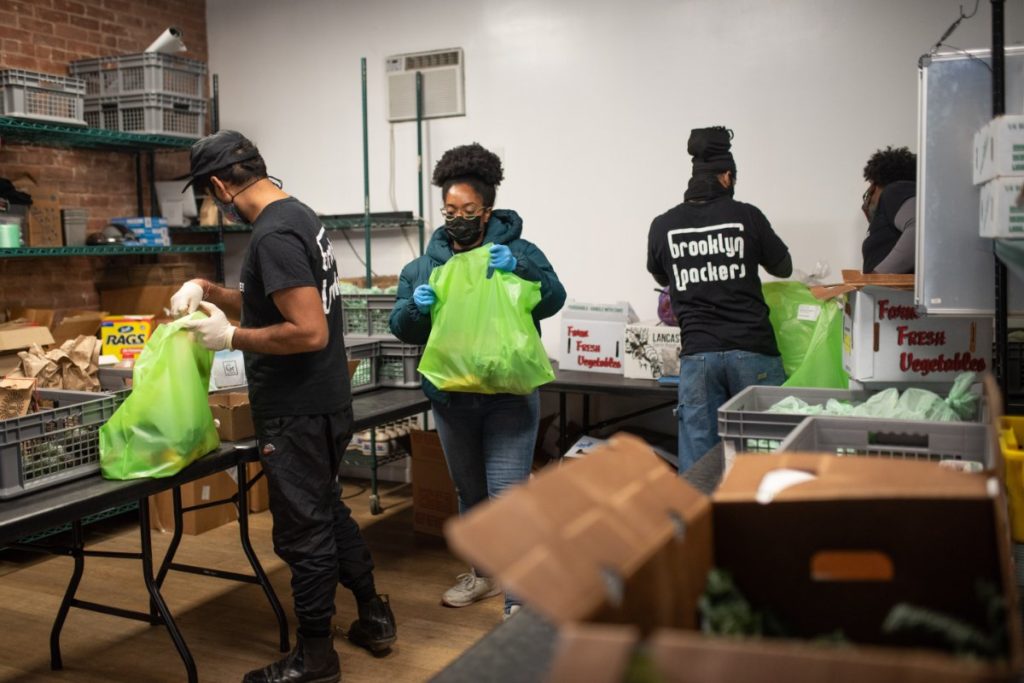
A version of this article originally appeared in The Deep Dish, our members-only email newsletter. Become a member today to get the next issue in your inbox.
Just outside of their new facility in Bed-Stuy, in late 2021, the members of Brooklyn Packers, a Black- and worker-owned cooperative, end their week with a farm stand. As the afternoon winds down, Karna Ray, a musician and organizer and one of the five worker-owners, buzzes around with an orchestrated precision, putting the boxes of purple radishes, little gem lettuce, and shallots away in a walk-in fridge. The vegetables are left over from their weekly orders, as a food distribution cooperative that functions increasingly like a hyperlocal food hub.
“We’ve never had a space before,” said Ray. “Feeling landed somewhere is a huge relief.”
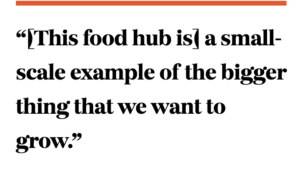
They were three months into leasing the storefront—which is just big enough for a long table for packing boxes and rows of industrial shelves stacked with honey, maple syrup, and root vegetables still smelling of sweet dirt. The space is mainly a packing and distribution center, but on Thursdays, between 4 and 6 p.m., people can swing by the farm stand, or pick up groceries from their community supported agriculture (CSA), known as Brooklyn Supported Agriculture (BSA), sourced from nearby, small-scale farms.
The Packers’ newly leased space is key to their larger vision—already well underway—of building a local production and distribution network of farms, retailers, nonprofits, and other businesses, largely owned by Black folks and other people of color. The honey, for instance, is sourced from Zach & Zoë, a Black-owned apiary in New Jersey, while the maple syrup comes from Triple J Farm, run by a Black family in New York’s Hudson Valley. The idea is that by networking together in a coordinated system, they will shorten the supply chain and drive down the cost of high-quality local food in Brooklyn.
As Ray put it, they hope to “make these things that are usually a rarefied commodity—like actual vegetables from real people—accessible to everybody.”
Since its founding in 2016, the Packers have been working out of temporary spaces—an old lighting factory, a church, a community center, the dining room of the nearby Haitian restaurant Grandchamps, and the Pfizer Building—to name a few.
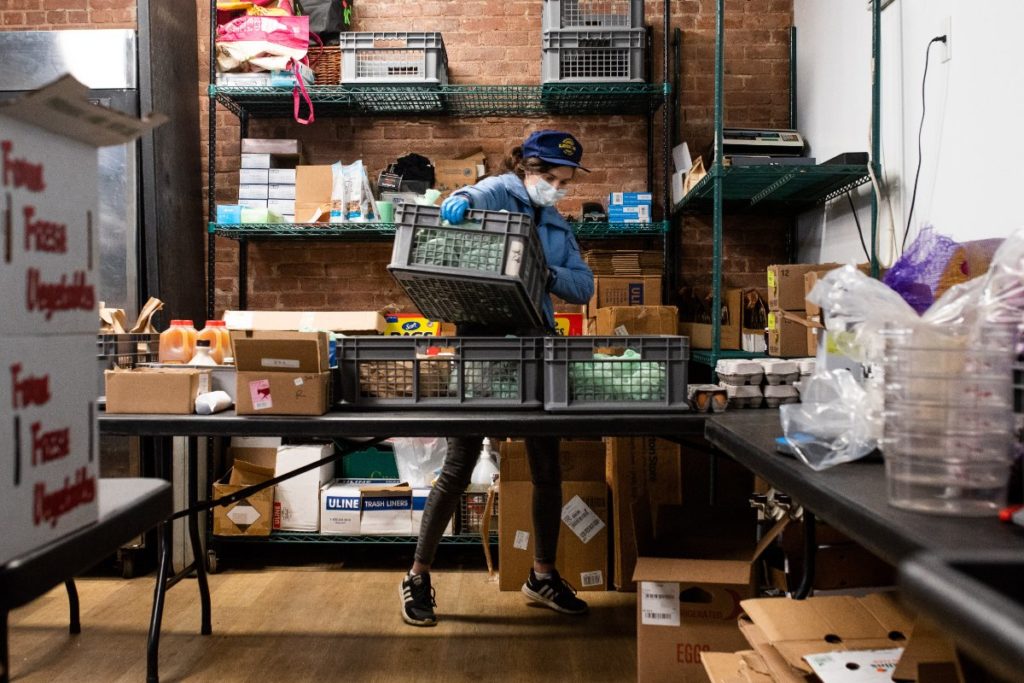
They refer to the rental space as “the hub” because it functions as the central spoke in this interconnected system, built on the community relationships they’ve cultivated. “It’s a micro hub, basically. We receive and distribute food from there. We store food there. We have a little market outside sometimes. We interact with the community,” said Steph Wiley, a founding owner of the cooperative and entrepreneur. “It’s a small-scale example of the bigger thing that we want to grow.”
The bulk of the group’s work involves sourcing, packing, and distributing food for mainly Black and Latinx-owned businesses. Their most forward-facing work is BSA, available for pick-up, delivery in Queens and Brooklyn, and with their local partners, such as the community organizing hub Mayday Space and the Black-owned food market Buy Better Foods. They also work in a more behind-the-scenes role, packing and distributing for mutual aid groups such as Bed-Stuy Strong and East Brooklyn Mutual Aid, and nonprofits including Ancient Song Doula Services.
“They are community focused and it’s run by BIPOC individuals,” said Chanel Porchia-Albert, founder and CEO of Ancient Song. “That was really important to me as a woman of color organization whose primary constituents are Black, brown, and Indigenous folks.” Since the height of the pandemic, Ancient Song has partnered with the Packers to host a monthly giveaway of groceries and other essentials. As food prices have spiked, she says this is especially important.
This way of operating is on par with the definition of a food hub. “Food hubs are pretty unique from place to place. But what I usually tell people is that they are a business that aggregates, distributes, sells, and markets local and regional food products,” said Jillian Dy, former deputy director of the Common Market MidAtlantic. That said, Dy notes, “If you’ve seen one food hub, you’ve seen one food hub.”
Mission-driven food hubs prioritize a commitment to values, whether it’s local food procurement, or supporting Black-owned producers and businesses. Unlike other food-distribution models, these operations tend to place sustainability, community impact, and social justice at the center of their work—across the entire production and distribution chain.
For members of the Brooklyn Packers, the fact that they’re building a micro food hub as a worker-owned cooperative is key. It harkens back to the Black-led work toward self-determination and collective care seen in previous generations, and it allows for a model that rejects some of the most problematic elements of food retail. Their success comes from building relationships, within the cooperative and the broader community—the backbone of their hyperlocal food hub.
The challenge with any work related to the food system is the low profit margin paired with physically challenging work. With the worker-owned model, the Brooklyn Packers all have an equal stake in the process and the profits, and they make major decisions through voting and a discussion process. “I think that’s where our expertise actually lies—in how we organize ourselves and how we make decisions as a labor cooperative,” said Ray.
From Responding to the Emergency to ‘Building Something Real’
The members of Brooklyn Packers are the first to admit that this vision for a cooperative, community-based food hub is still a work in progress. They’ve lately been grappling with fundamental questions, such as how to build a funding mechanism that doesn’t compromise their principles and values labor across the entire supply chain.
“We’re still growing and making necessary changes,” said Scott Wiley, Steph’s brother and another worker-owner. “How do we sustain what we want to do?”
During the height of the pandemic, the Packers’ mission was simple: responding to the immediate need, the growing pantry lines of the 1.5 million New Yorkers couldn’t afford food by October 2020. It became evident that the city itself didn’t have the existing local infrastructure or community networks to respond to the food crisis effectively, so it relied heavily on local groups, like the Brooklyn Packers, to fill in the gaps.
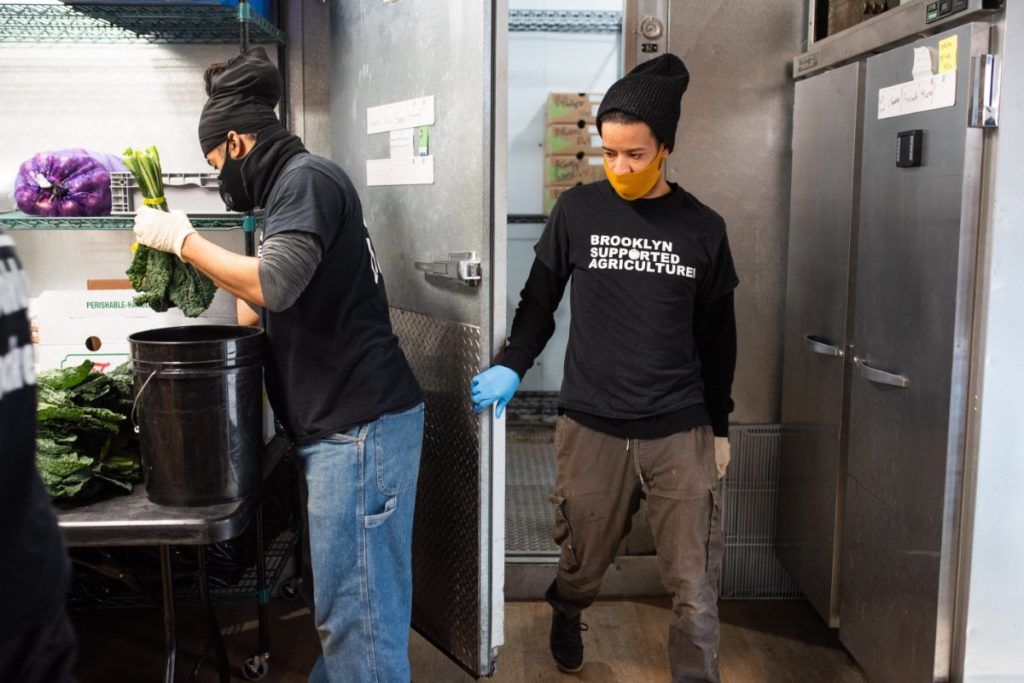
The Packers rapidly scaled up their operation, hiring employees for the first time, under a contract with the Corbin Hill Food Project to deliver emergency food boxes under the city-funded program, COVID-19 Emergency Food Distribution (GetFoodNYC), which ran from the spring of 2020 to the fall of 2021. “At its peak, in April of 2020, the program provided 1 million home-delivered meals a day to New Yorkers,” said a representative from the Mayor’s Office of Food Policy in an email.
They put their longer-term vision on hold to respond to the crisis. And they quickly learned how to do mass distributions of food. They moved into a lighting warehouse during this period. Shawn Santana, one of the group’s co-founders, who had never worked as a trucker prior, learned how to drive a refrigerated truck that contained 12 pallets of food, navigating the often-crowded Brooklyn streets.
“We were all essentially working on quicksand all the time. In and out,” said Ray. They typically worked six days a week, while continuing to run the BSA alongside the emergency distribution. “I would go home after working around the clock and go sit in the bathtub at like 6 p.m. and just fall asleep.”
The Packers’ strengths as a food distribution cooperative, embedded in local communities and equipped to quickly move food about the city, made the group uniquely poised to help. This included helping scale up the operations of volunteer-based mutual aid groups, which often began by making individual grocery runs.

Sandrine Etienne is among the mutual aid volunteers who worked alongside the Brooklyn Packers with East Brooklyn Mutual Aid (EBMA). As a medical social worker, with patients in Brownsville and East New York, Brooklyn, she witnessed the acute food insecurity her clients—many who already were suffering from diet-related illness—were facing during the pandemic. After observing how much neighbors enjoyed produce given away by the Packers, Etienne advocated for EBMA to switch to routinely providing fresh produce.
“I have to educate my clients all the time about foods that are high in sodium, like canned stuff. It just seemed wrong to be advocating for this group [that was] just giving out canned stuff,” said Etienne.
Soon the Brooklyn Packers started hiring and training some of the EBMA volunteers to work with them on large-scale packs. Sally Weathers, a current worker-owner in the cooperative, started off as an EBMA volunteer.
Weathers didn’t know who they were, but one day someone from Brooklyn Packers asked if she could stay after she was done with her pack. “I ended up staying for like four hours, trying to keep up because it was really fast. You have to learn how to do that,” she said. “And then, at the end of the day, I found out that everyone else on the line was getting paid and it was their actual job.” She was hired that week.
Like Weathers, Ray started working with the Packers as a temporary employee. “One thing that did get me while working with mutual aid groups is this reliance on volunteers to do a lot of labor,” he observed. This is where the Brooklyn Packers differ from volunteer-based mutual aid groups. While driven by similar principles of food justice, their goal is to fairly pay all of their worker-owners, building long-term good jobs. “I think it’s important that we’re organized as a labor cooperative, as opposed to a mutual aid group,” said Ray.
Now, as the cooperative pivots away from emergency food distribution work, the members see the new hub as an important step in building a food system with deep-rooted longevity—a more permanent space and a reflection of the larger system in the works. As a cooperative, they’ll be making these financial decisions collectively, with a shared goal in mind: “Instead of looking for these sources of emergency funding, what we’re trying to do is build something real,” said Ray.
City Funding In Crisis
When the city’s emergency food box program ended in October 2021, it left many community groups scrambling. The Packers were forced to quickly downscale their operation and make hard decisions, including laying off people they hired during the pandemic. They had anticipated that the program would last longer, given that unemployment and food insecurity in New York City remained high.
The city said the need has dropped, however. “As the city continued into recovery, demand for this program rapidly decreased,” said the representative from the mayor’s office.
Tahirah Cook, policy advisor and board member of Just Food, is concerned about the larger trend. Cook used to manage funds from the N.Y. State Department of Agriculture and Markets (NYSDAM) and was involved with the state’s initiative to fund a food hub in Central Brooklyn, in a hub-and-spoke-model, with smaller “spokes,” or micro-hubs in key neighborhoods. The model was the result of years of study and millions of dollars of investment by the state; a NYS Regional Food Hub broke ground in March 2021 in the South Bronx with a goal of expanding GrowNYC’s wholesale infrastructure when it is completed in the fall of 2023.
During the pandemic, she says many of the community groups that had been funded to create alternative food economies, like CSAs and farm stands, transitioned to emergency food distribution, while the NYSDAM office in NYC shifted from working on sustainable food systems work to emergency food efforts.
“We started seeing all of this [funding]—federal, private, state, city—really start pumping into these emergency food programs,” said Cook. “It wasn’t surprising to me that funding ran out, but also that a lot of organizations were burned by it, because there was so much money and so many people were going after it.”
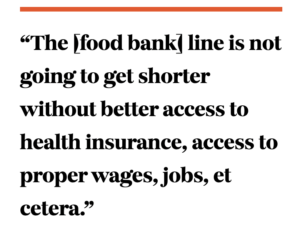
Yet this rapid influx of funds wasn’t designed to last. Although the Brooklyn Packers is distinct from the mutual aid groups, Cook said they also face the same questions about whether and how to carry on the work that started in an emergency, now that funding has dried up: “What are you going back to? Are you basically creating [a new] organization?” asked Cook.
She points to a lack of strategy and sustainable investments in long-term solutions to food insecurity that has put many people and projects back at square one.
“The [food bank] line is not going to get shorter without better access to health insurance, access to proper wages, jobs, et cetera,” she said. “What didn’t happen was a strategic conversation between the state and the city and the private funders to say, ‘Hey, once the state funding dries up, we’ll kick in the city funding in a way that’s more strategic. What happened was all the funding [left] at once.”
The Brooklyn Packers see this experience as a lesson. “[Programs] oriented around emergencies tend to wither away, and the infrastructure that goes along with them can’t be supported,” said Ray. “So, we’ve learned a lot.” Responding to the crisis not only changed the structure of the work, but prohibited them from building and capitalizing on the partnerships they depend on to do the work sustainably. Finding a permanent space in Bed-Stuy, where they started, has brought them back full circle.
A Cooperative Food Hub That Reflects the Community
Anyone who’s spent time with the Packers would immediately notice the ease and joy with which they relate to each other. Laughter punctuates the rustling sounds as they open and fill their signature green biodegradable bags. Inside jokes and friendly jabs expressed on the group text message continue throughout the day as they work. Although Steph and Scott Wiley are brothers, the other partners say they feel like the overall familial relationship also extends to them.
“When they drop off the food, it’s like, ‘Oh, hey, what’s up? How are you? How are your children?’ Like that kind of a thing,” said Albert, referring to the monthly food and essentials giveaway at Ancient Song.
As the Brooklyn Packers think through their next steps, they continue to return to an idea that’s long been there: building upon their relationships to form a cooperative, community-based micro food hub, as part of a regional distribution network.
As detailed in a report by Dara Cooper, a national organizer and co-founder of the National Black Food and Justice Alliance, and the Center for Social Inclusion, Black communities have built regional food hubs and cooperatives for decades—often as a means of “countering dispossession, building power, reclaiming culture, improving health conditions, growing economic opportunities, and dreaming and reclaiming alternate realities.”
Recently, the cooperative has decided to invest more of their profits back into their business, a risk they’ve taken on collectively with the hope that it will pay off.
“We are the masters of our own fate in this small realm. We bought a new website, we got this space, and we got a big fridge,” said Ray. “That probably means we’re going to be in a tight spot [financially]. But we have something we all decided on together.” The group has also put in work to make the food it distributes available through Supplemental Nutrition Assistance Program (SNAP) in the near future, which should make its programs even more accessible to low-income New Yorkers.
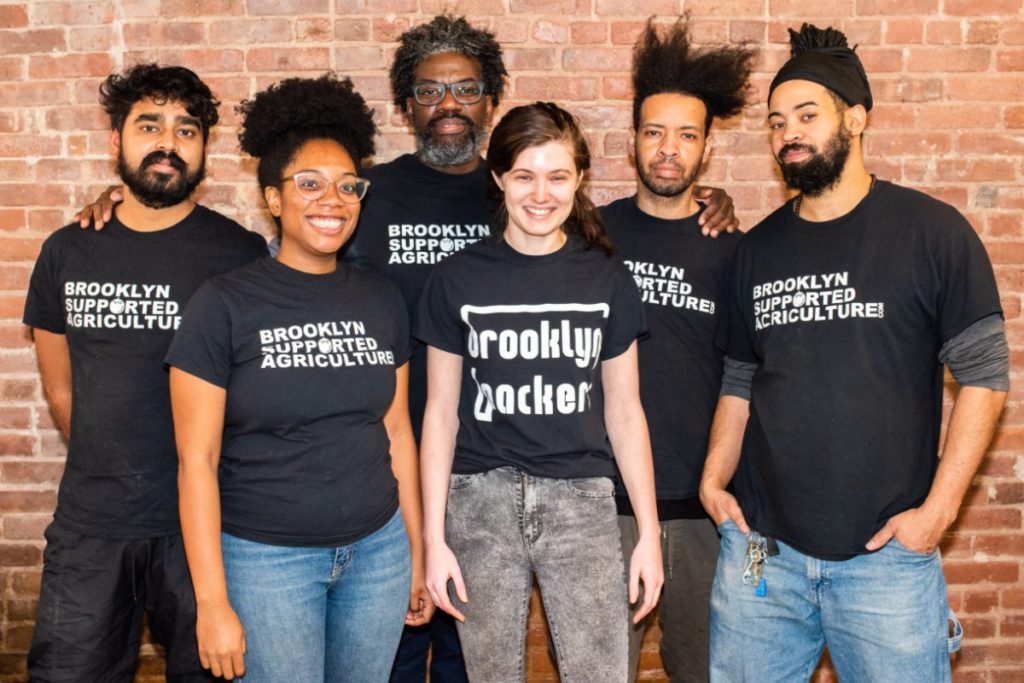
Over the years, they’ve come to trust each other, growing more confident in their individual strengths and roles, enough to make smaller decisions on their own. For instance, Raina Kennedy, a board member of and organizer for the Central Brooklyn Food Cooperative and recent graduate of the NYU Food Studies program, handles sourcing. The group trusts her decisions about what specific produce to buy each week, and when it comes to larger decisions—such as whether or not to add a new farm to the network—she brings it to the group. So far, she has found this way of working to be dignifying.
Like Kennedy, each member-owner has an operational niche: Ray has carved out a role handling data work and business development, building on his work co-founding a labor union for musicians. Santana, a former restaurant owner and caterer, handles transportation. Steph Wiley spearheads partnerships and business development. His brother Scott, also an entrepreneur, heads up the warehouse operations.
In the coming months, the group intends to add more farms and producers to its CSA program. Just last month, for instance, it added Star Route Farm, which donates the vast majority of its produce to mutual aid and emergency relief. At the same time, it is in active conversation about what a larger, regional food distribution network could look like.
In collaboration with Sabrina Brockman, the owner of Grandchamps restaurant, the Packers applied for a city agency grant that would support large-scale procurement and food distribution in the city. Though they didn’t receive the grant, Brockman is focused on ways to work more intentionally with them to scale the work.
“How do we collectively do things better?” she asks both of herself, and of the food landscape. “This [is a] hyperlocal model that supports the people who live in the area. [How do we bring] local economies closer together and make them more supportive to each other? That system that’s being created needs to be protected.”
In this way, the Brooklyn Packers are connecting parts of a food chain that already exists but has operated in a scattered, less operationalized form. The general principle is “allowing other people and groups to do what they do best to help us do what we do best,” said Wiley. But it won’t happen overnight. “We are trying to change the food system. And it’s slow work.”
When it comes down to it, human relationships take time. “Communication. That’s what people don’t have time for,” said Brockman. Focusing on building better relationships with the resources available, she believes, can create stability in the Brooklyn supply chain.
“This is an ecosystem of people, and [that] requires working slowly,” said Ray. “But it’s much more gratifying, and I think it holds strong roots in the future.”
